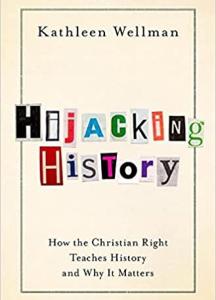• Good news first: The Slacktivixen has now tested negative two days in a row. She’s Covid free, feeling better, and now busily converting the Other Living Room/Not a Dining Room from a quarantine ward into a Jiffy seed-starter forest.
• This is a good interview with SMU historian Kathleen Wellman about her book Hijacking History: How the Christian Right Teaches History and Why It Matters.
The white fundamentalist Christian private school I grew up in back in Jersey used some Bob Jones and Abeka textbooks, so I remember reading lessons based on what Wellman describes here: “[These textbooks’] treatment of slavery and the Civil War still includes elements of the Lost Cause mythology — the enslaved were well-treated and exposed to Christianity, Confederate generals Stonewall Jackson and Robert E. Lee were heroic men of honor, etc.”
 What I found most interesting in this interview, though, was Wellman’s response when she was asked to define the religious right: “The argument advanced by the Christian Right is that you truly cannot be a Christian without espousing the political positions of the Right.”
What I found most interesting in this interview, though, was Wellman’s response when she was asked to define the religious right: “The argument advanced by the Christian Right is that you truly cannot be a Christian without espousing the political positions of the Right.”
It’s easy to look at the Christian Right and get this backwards — to see the Christian Right as an effort to reshape politics in accord with Christianity. But it ain’t that. It’s an effort to redefine Christianity in accord with right-wing politics. This is why the Christian Right can accommodate doctrinal diversity but not political diversity. You can be a member of the Christian Right in good standing while believing either that speaking in tongues is mandatory or that it is forbidden, but you cannot belong if you believe that the Reconstruction Amendments are legitimately constitutional.
The Christian Right is an effort to shape politics according to sectarian dogma, but only after first reshaping that sectarian dogma to conform to a particular form of white right-wing politics. It is politically bounded and politically defined, but it’s primary focus is on transforming Christianity itself: “You truly cannot be a Christian without espousing the political positions of the Right.”
• “A culture of racist corruption in Clark Township.” That’s the New Jersey town named after my family, but that’s not why this story caught my attention. It’s just the jaw-dropping brazenness and defiant we’re-in-charge-so-what’re-you-gonna-do-about-it? entitlement displayed by almost everyone in charge of Clark’s local government.
The Star-Ledger editorial linked above does a good job on summarizing the “culture of racist corruption” in Clark and naming the names of most of those who need to be in another line of work. The editorial calls on the state attorney general to intervene. Voters in Clark could make that unnecessary by kicking out Mayor Sal Bonnaccorso and every member of his complicit rubber-stamp council, but they’re all Republicans and Clark is 84% white and white identity politics probably makes that unlikely. White voters tend to favor the White Party, even when that means paying more than $1 million (so far) for a failed cover-up.
In the meantime, if you’re on the Parkway, it’s probably safest not to get off at Exit 135.
• More Republican voter fraud:
New Hampshire Republican congressional candidate Matt Mowers voted twice in the 2016 presidential primary, according to public records. Mowers, who worked on New Jersey Governor Chris Christie’s campaign, cast an absentee ballot in the Granite State’s early primary. But when Christie’s campaign failed to get off the ground, Mowers re-registered in New Jersey, using his parents’ home address, and cast a second ballot there during its late-season contest.
• Mark I. Pinsky was a war correspondent on the frontlines of the culture wars of the ’90s — by which I mean he covered the Southern Baptist Convention’s half-assed “Disney Boycott” as a religion reporter for the Orlando Sentinel. He later wrote The Gospel According to Disney (for Westminster John Knox Press).
So if you’re too young to remember the last round of White Panic backlash against Disney, or if you just need a reminder 25 years later, Pinsky’s a reliable guide: “DeSantis’ Attack on Disney Recalls a ’90s Culture War That the Right Lost.”
Boycotts only work when they’re focused on a particular demand they want to see addressed. That ’90s “boycott” never caught on because Southern Baptists weren’t sure what it was they were being told to be upset about or what it was they were supposed to be demanding that Disney change. And most Southern Baptists liked Disney. Yeah, OK, maybe they didn’t like that some subsidiary-of-a-subsidiary publishing house partially owned by Disney had printed Heather Has Two Mommies, but how was cancelling your vacation plans and upsetting the kids supposed to change that?
I suspect the current effort to demonize Disney will encounter the same problem. Just consider trying to argue that, “You can watch Venom, because that’s Sony, but you can no longer watch Spider-Man: Homecoming because that’s Disney and therefore a threat to all that is decent and wholesome.”
• The title to this post comes from this John Gorka oldie, which seemed appropriate due to that Clark Township item:
















